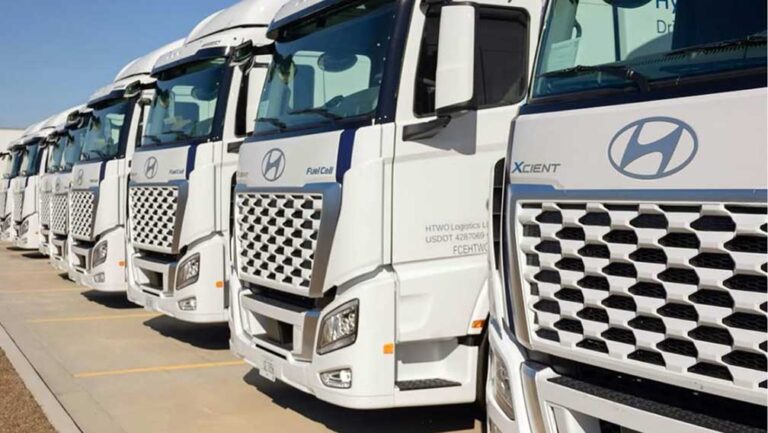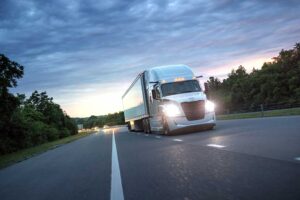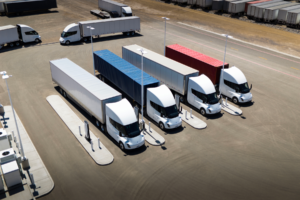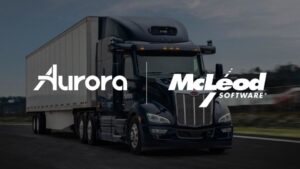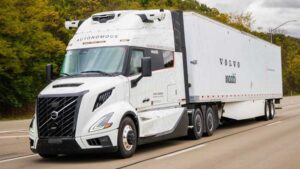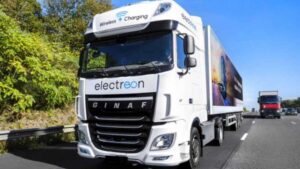Picture this: trucks cruising down highways without spewing pollution everywhere. That future is here, thanks to Benore Logistic Systems Inc., which just rolled out 14 Hyundai Xcient hydrogen-powered trucks in Savannah, Georgia. This move isn’t just a big step for Benore’s sustainability efforts — it’s also making them a leader in green tech for freight transportation.
But is this the start of something big, or just a detour on the road to sustainability?
A bold step toward sustainability
Benore Logistic Systems’ journey into hydrogen-powered logistics began with a small but significant step in 2022, when it rolled out its first four fuel-cell trucks.
Building on that success, the company has now expanded its fleet with these additional 14 trucks. They’re operating on dedicated routes in Savannah, serving the Hyundai Motor Group Metaplant America (HMGMA), a facility that’s all about clean logistics operations. These trucks offer an impressive all-electric range of nearly 450 miles, marking a significant leap forward in sustainable transportation.
Dennis Kunz, Vice President of Revenue Strategy and Operation Development at Benore, highlighted the importance of this initiative, saying, “These hydrogen fuel cell trucks represent a significant step forward for Benore and our ability to deliver innovative, sustainable logistics solutions.” It’s clear that Benore is serious about making a positive impact on the environment.
EXPLORING HYDROGEN-POWERED VEHICLES FOR THE FUTURE OF TRANSPORTATION
Strategic partnerships driving innovation
The deployment of these trucks is part of a broader collaboration between Benore, Hyundai Motor Group and HTWO Logistics — a joint venture between Hyundai and Glovis America. Hyundai manufactures the trucks, HTWO oversees deployment and Benore manages daily logistics to ensure seamless operations for the Glovis EV contract. This partnership shows just how committed Benore is to delivering innovative, sustainable solutions that align with its Just-In-Time and Just-In-Sequence operations.
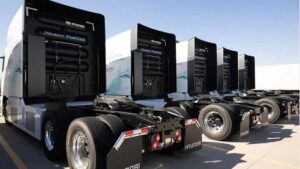
HYDROGEN POWERED RESCUE TRUCK JUST SMASHED A WORLD RECORD AND IT ONLY SPITS OUT WATER
Infrastructure supporting hydrogen logistics
To support this initiative, HydroFleet has invested $33 million in a hydrogen production and refueling hub near Savannah’s busy container port. This facility will initially refuel up to 21 trucks daily and can scale up to over 300 trucks per day in the future. Such infrastructure investments are crucial for expanding hydrogen-powered freight solutions across the region.
Industry trends and challenges
Benore’s adoption of hydrogen-powered trucks aligns with a growing industry trend, joining other major players like Werner and DHL Supply Chain in embracing this clean technology. Hyundai has emerged as North America’s leading supplier of hydrogen fuel-cell trucks, maintaining momentum despite setbacks faced by competitors such as Hyzon and Nikola. The increasing interest in hydrogen technology stems from its substantial potential to reduce emissions, with each Class 8 truck capable of eliminating over 400 metric tons of CO2 annually.
However, the transition to hydrogen fuel cell trucks is not without its hurdles. High initial costs pose a significant barrier, particularly for smaller companies, due to expensive fuel cell technology and specialized hydrogen storage systems. The slow development of hydrogen fueling infrastructure remains a critical challenge, impeding widespread adoption. Additionally, the current hydrogen production landscape, dominated by methane-based processes, falls short of the desired environmental benefits.
Technological refinement is ongoing, with continued testing needed to verify range estimates, assess performance across various conditions and address maintenance issues affecting fueling station uptime. Achieving cost parity with diesel fuel is crucial for mass adoption, with estimates suggesting hydrogen needs to reach $4 to $5 per kilogram to compete with diesel at $3 to $4 per gallon.
Despite these obstacles, the potential for significant emissions reduction continues to drive interest and investment in hydrogen fuel cell technology for the trucking industry. As companies like Benore lead the way, the sector watches closely to see how these early adopters navigate the challenges and pave the way for a cleaner future in heavy-duty transportation.
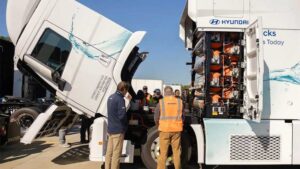
Hydrogen-powered vehicles: Addressing questions and challenges
Hydrogen-powered vehicles have ignited interest in their potential to revolutionize transportation. However, their adoption raises critical questions about cost, environmental impact, safety and infrastructure. Below is a summary of key insights and challenges based on expert analysis.
Cost and feasibility
- High production costs: Hydrogen currently costs about $16.51 per gallon equivalent compared to diesel at $4.62, with significant energy (8,410 kWh) required for production. However, the price varies greatly depending on the region and production method.
- Energy efficiency concerns: Scaling hydrogen production to reduce costs remains a major challenge.
Environmental impact
- Green vs. gray hydrogen: While green hydrogen (produced via renewable energy) offers near-zero emissions, most hydrogen today is derived from fossil fuels (gray or blue hydrogen), which emit CO2 during production.
- Water vapor emissions: Though water vapor is a byproduct, its localized warming effects are minimal compared to CO2.
Safety considerations
- Flammability risks: Modern hydrogen storage tanks are designed to withstand extreme impacts, but public concerns about safety persist due to historical incidents like the Hindenburg disaster.
- Emergency Protocols: Innovations in tank durability and emergency response systems are crucial for public trust.
Performance in extreme conditions
Hydrogen vehicles perform well across various temperatures but face challenges such as freezing water vapor emissions in cold climates. Integrated heating systems may mitigate these issues.
Infrastructure and Logistics
- Distribution challenges: Hydrogen requires specialized storage and refueling infrastructure. Converting existing gas stations could lower costs, but widespread adoption demands significant investment.
- Remote refueling solutions: Portable hydrogen generators are being developed to address refueling in isolated areas.
Comparison with electric vehicles (EVs)
Hydrogen vehicles offer faster refueling times and lighter energy storage compared to EVs. However, hydrogen production is more energy-intensive, while EV batteries face sustainability concerns due to rare earth mining and recycling issues.
Broader barriers
Economic and political hurdles, including high initial infrastructure costs and lobbying by traditional energy sectors, remain significant barriers to mass adoption.
Next steps for research
Key areas for future exploration include:
- Lifecycle emissions analysis to identify sustainable production methods.
- Innovations in safety protocols for hydrogen storage.
- Expanding hydrogen refueling infrastructure.
- Scaling production to make hydrogen cost-competitive with fossil fuels and EVs.
Hydrogen-powered vehicles represent a promising step toward sustainable transportation. However, their success hinges on overcoming economic, environmental and logistical challenges through innovation and collaboration.
BIG RIGS DELIVER CARGO WITH NO HUMANS AT THE WHEEL
Kurt’s key takeaways
By jumping on cutting-edge technology and greener practices, Benore is showing the industry what’s possible. As Dennis Kunz put it, these trucks are paving the way for cleaner transportation that benefits both the planet and generations to come. With Savannah emerging as a hub for innovation, this partnership feels like a big step forward for green logistics.
The real question is: Will it stick, or is it just a detour?”
Do you think the potential benefits of hydrogen fuel cell trucks—such as zero emissions and faster refueling—could outweigh their current challenges, or are they destined to remain a niche technology? Let us know by writing to us at Cyberguy.com/Contact.
For more of Kurt’s tech tips & security alerts, subscribe to the free CyberGuy Report Newsletter at Cyberguy.com/Newsletter.
Copyright 2025 CyberGuy.com. All rights reserved.
Kurt the CyberGuy is an award-winning tech journalist who helps people make smart tech decisions from his contributions to Fox News & FOX Business, beginning mornings on “FOX & Friends.”
Ask Kurt a question or let us know what stories you’d like us to cover.
Follow Kurt on his social channels:
Facebook • YouTube • Instagram
Kurt Knutsson — best known as “Kurt the CyberGuy” — has a deep love of technology that makes life better. Because of this, along with a passion for helping others, he created the largest syndicated tech lifestyle franchise on television. As a trusted source, Kurt’s unique insider access to major tech launches and industry visionaries has helped earn him two Emmy Awards and a Golden Mic.
Kurt lives between his home in California and New York City, where he is also the chief tech contributor on Fox News & Fox Business networks beginning his mornings on Fox & Friends.
Kurt’s a curious guy. Like many entrepreneurs in life, he wears several hats like running a private investment fund, giving inspirational talks, mentoring start-ups and traveling the world chasing down the next breakthrough.




